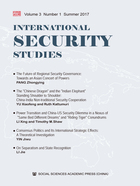
2 “Peace through Trade” and “Peace through Development”
Since the end of Sino-Vietnamese War in 1979, there has been no major warfare in Asia, and this accounts for nearly 40 years of peace, a relatively long period in the history of international relations. What made such a period possible? It is time to study the major contributing factors.
One of the existing theories that could explain this peaceful period is, of course, the argument of “Peace through Trade.” Indeed, by 2015, China has become the No. 1 trading partner to almost all Asia-Pacific nations. It appears the theory “Peace through Trade” has found compelling evidence in Asia.
China’s foreign policy, in general, was characterized by “peaceful development” during this stage. China was not the only country to enjoy rapid economic development, other countries in Asia, particularly India and Southeast Asian countries, also placed their focus on development. “Peace and development” were even considered “the main theme of the world.” At least it has been the main theme of Asia in the past 30 years (1980-2010). This theme was summarized as “econophoria” by British foreign relations theorists,[6] and enunciated by late Chinese leader Deng Xiaoping in his saying: “Development is the absolute principle.” It was also reiterated in the political reports at the 17th and 18th CPC National Congresses: “Development is the first priority.”
In international relations theory, the subject of peace and development is significant in that development, especially the development of China, India and Southeast Asian countries, is the reason for peace. Following “Peace through Trade,” the theory of peace has gained a major breakthrough in the form of “Peace through Development,” which is the topic of this paper.
However, both “Peace through Trade” and “Peace through Development” leave questions unresolved. For instance, trade or development entails competition, which leads to trade disputes and conflicts over resources. Trade and development may be the source and safeguard of peace, but does that mean when trade or development is curtailed or stopped, peace will be interrupted as well? And how can trade and development be sustained in order to safeguard peace?
There have been questions over the validity of “Peace through Trade,” likewise “Peace through Development” theory is not without its critics.
In conclusion, trade and development alone are not enough for peace, trade and development that are imbalanced, unfair, exploitative and strategic may not promote peace but rather cause conflicts, even war.[7]